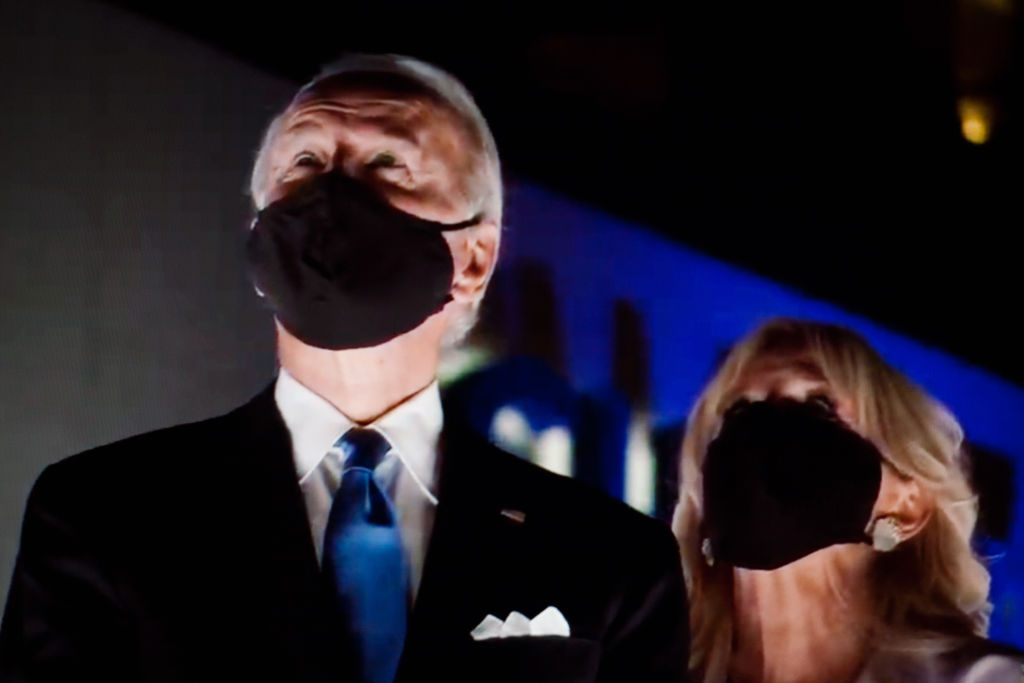
Obama was famous for his ‘Yes We Can’ speech. Donald Trump kicked off his presidency with his ‘American Carnage’ speech. And on Thursday, former Vice President Joe Biden accepted the Democratic nomination with a speech that may one day be known as the ‘Light and Darkness’ speech.
Speaking to a nearly empty hall, closing out a convention that was entirely digital because of a pandemic that has killed more than 170,000 Americans and left millions out of work, Biden delivered a speech that at once acknowledged the depths of the nation’s despair and laid out hope for the future. He promised to deliver Americans from what he called the “darkness” of the Trump presidency into what he called “a path of hope and light.”
Throughout his speech, he touched on his major policy agenda items, including his strategy to combat COVID-19, his plan to build back the economy, tackling racial injustice, and addressing the “existential threat” of climate change. But over and over he returned to the central theme: More than policy or ideology, the Biden campaign is rooted in a question of national character.
“The current president has cloaked America in darkness for much too long. Too much anger. Too much fear. Too much division,” he said. “Here and now, I give you my word: If you entrust me with the presidency, I will draw on the best of us, not the worst. I will be an ally of the light not of the darkness.”
The pairing of those two themes– darkness and light — is consistent with Biden’s broad attitudes about the forces that drive American history. Earlier, historian and author Jon Meacham, whose 2018 book title The Soul of America echoes Biden’s campaign slogan, delivered a five-minute speech on the final night of the convention, valuable political real estate rarely granted to a scholar. “America is a mix of light and shadow,” Meacham said, adding that “often we’d prefer to hear the trumpets rather than face the tragedies.”
It’s an idea that clearly resonates with Biden. “America’s history tells us that it has been in our darkest moments that we’ve made our greatest progress. That we’ve found the light,” Biden said, referencing Meacham’s argument. “And in this dark moment, I believe we are poised to make great progress again. That we can find the light once more.”
Make sense of what matters in Washington. Sign up for the daily D.C. Brief newsletter.
The speech was the emotional crescendo of four nights of digital programming during the Democratic National Convention, conducted almost entirely online this year due to the pandemic. The tightly produced event worked in Biden’s favor: there were no 2016-style protests, no meandering speeches or mishaps, and the TV-style production allowed the party to emphasize the personal stories of ordinary Americans, like young Brayden Harrington, who delivered a speech about the importance of seeing a president who overcame a stutter like his.
The focused programming also allowed the Convention to keep the emphasis on emotional themes like unity and empathy, friendship and grief, and gloss over internal divisions within the Democratic party and ideological differences with Republicans. The Convention was about emotional narrative, not ideological disputes.
Biden and his surrogates were careful never to criticize Trump voters, only Trump himself, by painting him as a President who has fallen down on the job. “Our current president has failed in his most basic duty to this nation: He failed to protect us,” Biden said. “My fellow Americans, that is unforgivable.”
“We will never get our economy back on track, we will never get our kids safely back to school, we will never have our lives back, until we deal with this virus,” he continued. “The tragedy of where we are today is it didn’t have to be this bad.”
Over and over, Biden returned to the themes of light and darkness to refer to both the broader forces of American history and the quiet horror destroying American families in the wake of COVID-19. He mourned with those who had lost loved ones — “I know that deep black hole that opens up in your chest” — and urged those grieving to “find purpose” and to “save our democracy. To be a light to the world once again.”
In speaking to the pain of families who had lost loved ones to the pandemic, Biden demonstrated what is perhaps his greatest political asset: his ability to convey authentic empathy to those in mourning. After losing his wife and daughter in a car accident in 1972 and his son Beau to cancer in 2015, Biden’s personal understanding of tragedy and loss have allowed him to express the pain of a nation in mourning in a way that Trump has so far failed to do.
In the minutes before he delivered his speech, his surviving children Hunter and Ashley spoke of his grief and perseverance, and their remarks ended with remarks from Beau Biden, delivered at the 2012 convention. So when Biden told American families, “I know how mean and cruel and unfair life can be sometimes,” that pain rang true.
After a lifetime of loss and triumph, Biden has a unique ability to express anguish without seeming defeated, and to offer hope without seeming trite. His insight, borne of years of personal and political experience, including eight years at the side of former President Barack Obama, is that the light and shadows coexist, and rarely does one totally vanquish the other. All you can hope for is to get the upper hand.
More Must-Reads from TIME
- Inside Elon Musk’s War on Washington
- Meet the 2025 Women of the Year
- The Harsh Truth About Disability Inclusion
- Why Do More Young Adults Have Cancer?
- Colman Domingo Leads With Radical Love
- How to Get Better at Doing Things Alone
- Cecily Strong on Goober the Clown
- Column: The Rise of America’s Broligarchy
Write to Charlotte Alter at charlotte.alter@time.com
